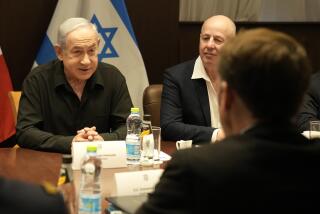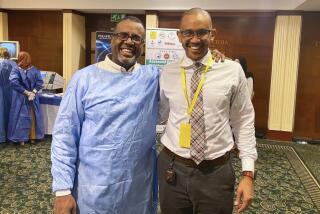Egyptian spymaster may have inside track to presidency
- Share via
CAIRO — He appears briefly on TV, not saying much, if anything at all, and then fades into the secrecy and quiet diplomacy that men like him prefer. One day he’s in Jerusalem, the next in Gaza, then back to Egypt to whisper in the ear of his boss, President Hosni Mubarak.
Omar Suleiman, the head of Egypt’s foreign intelligence service, has been at Mubarak’s side through triumph and crisis, including a 1995 ambush on the president’s motorcade that killed two security officers. It is this loyalty to an unpopular president whose 26 years in power have been marked by emergency law that may lift Suleiman even higher: He is often mentioned as a possible successor to the frail 80-year-old Mubarak.
Although he prefers tailored suits and smart ties, Suleiman has the military background that has defined Egyptian leaders since Gamal Abdel Nasser seized power in a 1952 coup. The gifted military strategist has years of diplomatic relations with the U.S., Israel and the Arab world, and he’s regarded as a pragmatist likely to carry on Egypt’s privatization and economic reform.
This balance is important to the West, especially Washington, which annually gives Egypt about $2 billion in military and economic aid.
“Suleiman is a bridge between Egypt’s military and security services,” said Robert Springborg, an expert on Egypt and director of the London Middle East Institute. “He’s in a very critical position. He has his hands on the control of Egyptian politics without having his hands dirty. No one else in the country has that role, and he’s also the principal foreign policy guy . . . a diplomat’s diplomat.”
Those predicting Suleiman may be the next president, however, quickly note one of his biggest obstacles: Mubarak’s son, Gamal, a 44-year-old entrepreneur, is also being groomed for the spot.
But Gamal Mubarak has image issues. He has no military credentials, lacks foreign policy experience and he sits in the leadership of the ruling National Democratic Party, largely viewed as driven by special interests and unable to stem inflation to improve the lives of the 45% of Egyptians who live on less than $2 a day.
NDP policies have led to Egypt’s growing economy and rising foreign investment, but many here bristle at the prospect of a Mubarak dynasty involving the president’s untested son.
It is difficult to read the bends and curls of Egyptian politics; the NDP is insular, and other voices, including the main opposition Muslim Brotherhood, have little influence.
Even though Egypt is a democracy, the army also plays a power-broker role. It could negotiate a deal with the NDP on a candidate or back Suleiman or one of its own generals as an independent in the 2011 elections.
“I believe the military has already decided on who will be the next president,” said Diaa Rashwan, a political analyst with Al Ahram Center for Political and Strategic Studies. He added that Suleiman “is one of the most likely candidates” because of his foreign policy resume and his ability to play down his military credentials and appear more civilian.
“That will give the impression that the army is not directly ruling the country,” Rashwan said.
One of the government’s most frequent critics, Ibrahim Issa, editor of Al Dustour newspaper, wrote in a recent column that a Suleiman nomination for president “was and still is welcomed by many sectors.” The column -- headlined “When will he speak?” -- challenged Suleiman to break his characteristic reticence and articulate his views.
“It seems that we are in dire need to hear from the man,” said Issa, who faces criminal prosecution for stories he wrote in 2007 about Mubarak’s declining health. He added that Egyptians need a “deeper understanding of him. There is no justification for this discretion.”
Suleiman’s profile has been rising. He was the chief negotiator in talks that led to the June truce between Israel and the militant group Hamas in the Gaza Strip. That success lifted Egypt’s credibility as a strategic player in the region, an image weakened over the last decade by the country’s economic and political problems, along with the growing influence of Saudi Arabia. The agreement also protected Cairo from a repeat of the security crisis it faced in January when hundreds of thousands of Palestinians broke through the Gazan border and entered Egypt.
The possibility of a Suleiman candidacy slipped into the gossip and maneuverings of Egypt’s political class several years ago. But some analysts suggest that the 73-year-old former infantryman turned spymaster may be considered too old, and his close ties to Mubarak and Washington a detriment at a time many Egyptians are angered at and dismissive of both.
Suleiman was born in Qena, a town in a poor region of Upper Egypt. He enrolled in a military academy and distinguished himself in the Arab-Israeli wars in 1967 and 1973. He moved through the ranks of government intelligence and in 1995 was credited with saving Mubarak’s life by insisting that he travel in a bulletproof limousine during a visit to Ethiopia. Mubarak and Suleiman were in the car leaving the airport at Addis Ababa when Islamic militants, who had sneaked in from Egypt, fired on the motorcade. The bullets did not pierce the president’s car.
Suleiman, who became more visible after the attack, knows the threats from Islamic terrorist groups that killed hundreds in this country in the 1990s. Radical Islam has its roots in Egypt, and Cairo is wary of ties between Hamas militants in Gaza and the Muslim Brotherhood, which controls 20% of parliament and wants to turn Egypt into an Islamic state.
The wider danger between now and the presidential election, however, may be the persistent inflation and low wages that have sparked labor unrest and badly damaged the ruling party’s reputation.
A telling example of how Egypt’s government has failed in the eyes of many arose in March when inflation led to bread shortages and long lines. Mubarak ordered the army, long revered as the backbone of the country, to bake bread to compensate for dwindling supplies. The crisis ended.
“Suleiman has the image of a respected law-and-order guy,” said Amr Hamzawy, an Egyptian political scientist and analyst for the Carnegie Endowment for International Peace. “He represents stability in a time of rising social tension.”
--
Noha El-Hennawy of The Times’ Cairo Bureau contributed to this report.
More to Read
Sign up for Essential California
The most important California stories and recommendations in your inbox every morning.
You may occasionally receive promotional content from the Los Angeles Times.














